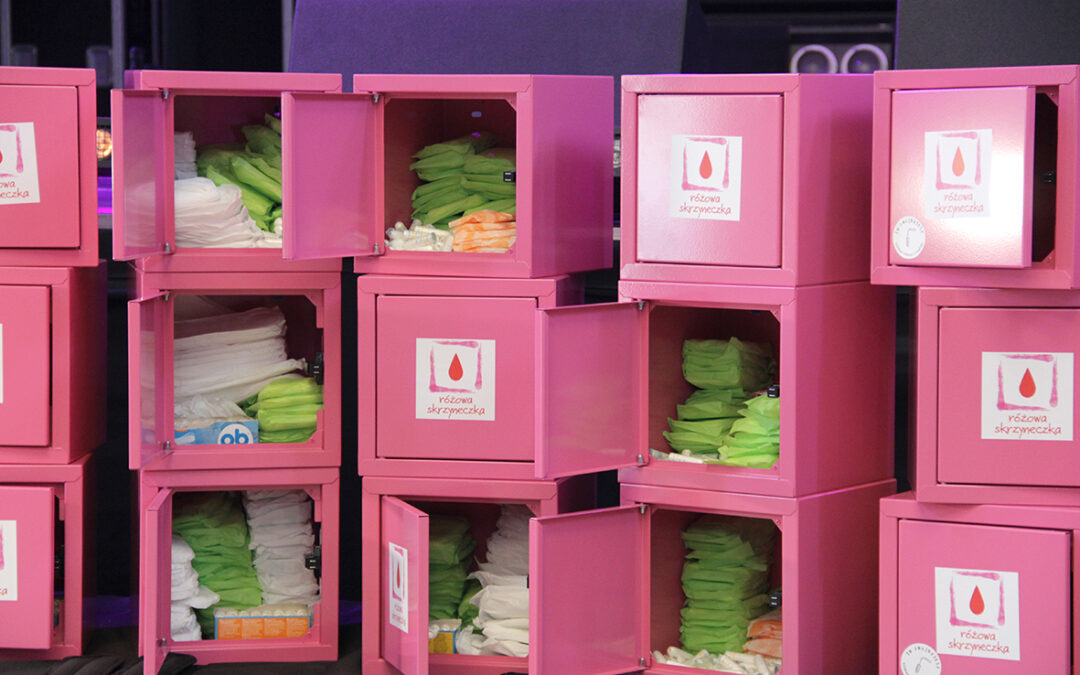Gdańsk is to become the first city in Poland to provide free, publicly accessible sanitary products for residents. The decision is part of a nationwide campaign aiming to fight period poverty, which is being joined by a growing number of local authorities, organisations and invididuals.
Following a request by city council chairwoman Agnieszka Owczarczak, “Pink Boxes” will be installed in various municipal offices and social centres across Gdańsk, while sanitary products will also be provided at schools in the city.
The Pink Box campaign was established in 2019, and has so far installed over 300 boxes across Poland to improve access to personal hygiene products.
According to a study published last year by the Dominika Kulczyk Foundation, 41% of Polish women said menstruation was never discussed in the family home, whilst one in five admitted they have struggled to purchase sanitary pads and tampons.
Last month, the second of Gdańsk’s two Pink Boxes was installed at its town hall, the headquarters of the city council, after Owczarczak heard about the campaign.
“More and more often people use phrases like ‘menstrual poverty’ and, to be honest, I did not know that it was a fairly big problem that also affects Polish women,” she admitted to Gdansk.pl.
After the box was installed in the town hall, Owczarczak petitioned Gdańsk’s mayor, Aleskandra Dulkiewicz, to place additional boxes in public areas.
The city’s infrastructure department responded by announcing that Pink Boxes will be installed in municipal offices, as well as at the headquarters of the Gdańsk Benefit Centre and at the Social Work Centre, paid for by the city council. Hygiene products will also be bought for secondary schools.
“I also hope that I will be able to publicise this campaign so that there will be communities in Gdańsk schools that will want to take care of the contents of such boxes on their own,” Owczarczak added.
Legnica, in southwestern Poland, also recently joined the campaign, announcing last week that it would install Pink Boxes at all schools in the city.
Przystąpiliśmy do ogólnopolskiej akcji "Różowa skrzyneczka"💟. Jeszcze w tym miesiącu różowe skrzyneczki wyposażone w środki higieniczne trafią do każdej legnickiej szkoły, a w przyszłości chcemy, aby pojawiły się one w innych miejscach w przestrzeni miasta. 💟 #legnica pic.twitter.com/mtUXOp8yBx
— Miasto Legnica (@MiastoLegnica) March 12, 2021
“Initially, pink boxes for sanitary napkins and tampons were initiated at a grassroots level, from local communities, student councils, activists and activists of local government organisations,” co-founder Adrianna Klimaszewska of the initiative, which began in Wrocław, told Gazeta Wyborcza.
“Now, however, local governments are getting more and more involved in providing residents with hygiene products for the duration of their menstruation,” she added. But Gdańsk is “the first local government to act in such a systemic way”, and its actions represent a “breakthrough” for the initiative.
Last April, the Polish government reduced VAT on sanitary products from 8% to 5%. However, the health ministry told journalists from HelloZdrowie, a health information service, that there were no plans to introduce free sanitary pads and tampons for women.
The Dominika Kulczyk Foundation survey found that almost 40% of poorer women admitted they had forgone sanitary products in order to spend the money on other items they considered more important or urgent.
In response to the issue, various organisations have stepped in to tackle period poverty. Last July, charity Menstruation Action announced the start of their “Hey Girls” programme, which aims to supply schools with sanitary products as well as offering classes to improve menstrual health.
Last year, Procter & Gamble and the Polish Red Cross launched the #AkcjaDonacja (#DonationAction) campaign, which has so far given free sanitary products to more than 35,000 girls in Polish schools. Procter & Gamble says that its research shows that one in six Polish girls have missed classes due to lack of access to hygiene products.
Main image credit: MiastoLegnica/Twitter

Juliette Bretan is a freelance journalist covering Polish and Eastern European current affairs and culture. Her work has featured on the BBC World Service, and in CityMetric, The Independent, Ozy, New Eastern Europe and Culture.pl.




















